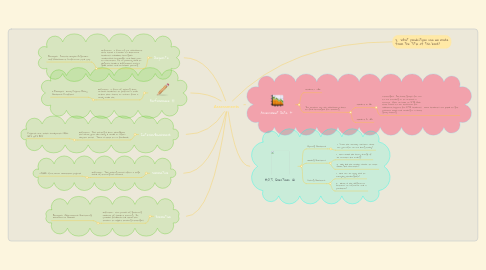
1. Interim/Benchmark
1.1. Definition: This testing is done throughout the school year, like every 6 weeks or after chapter tests. There is little to no feedback.
1.1.1. Projects, unit tests, checkpoints, CBAs, BOY, MOY, EOY
2. Diagnostic
2.1. Definition: a form of pre-assessment that allows a teacher to determine students' individual strengths, weaknesses, knowledge, and skills prior to instruction. It is primarily used to diagnose student difficulties and to guide lesson and curriculum planning.
2.1.1. Examples: Pretest, Graphic Organizer, Self-Assessment, Conference, Mind Map
3. Performance
3.1. Definition: a form of testing that requires students to perform a task rather than select an answer from a ready-made list.
3.1.1. 2 Examples: Group Project, Essay Questions, Portfolios
4. Summative
4.1. Definition: This testing occurs after a large chunk of learning has occured.
4.1.1. STAAR, final exam, cumulative projects
5. Formative
5.1. Definition: the process of gathering evidence of student learning. It provides feedback and allows the teacher to adjust teaching strategies.
5.1.1. Examples: Observations, Questioning, Discussions & Quizzes
6. 2. What predicitions can we make from the title of this book?
7. Assessment Data
7.1. Student 1 : 190
7.2. The teacher can use assessment data to find strategies for teaching.
7.2.1. Student 2: 195
7.2.1.1. Strategies: Pull small groups for one to one teaching or to reteach a concept. Also, we have an RTI Aide that comes to our classroom for additional support for RTI students. Some students are pulled to get resource math and reading in a small group setting.
7.2.2. Student 3: 185
8. H.O.T. Questions
8.1. Opening Questions
8.1.1. 1. From the warmup question, what can you infer we are doing today?
8.2. Guiding Questions
8.2.1. 1. How would the story change if we rewrote the ending?
8.2.2. 2. Why did the author choose to write about this character?
8.3. Closing Questions
8.3.1. 1. How can we apply this to everyday thinking/life?
8.3.2. 2. What is the difference between an inference and a prediction?

